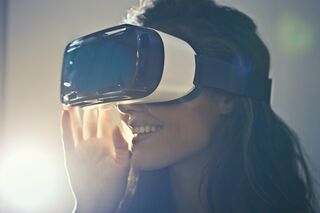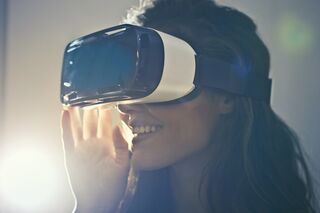
Source: Andrea Piacquadio/Pexels
New research published in JMIR Mental Health has found that virtual reality (VR) can be useful in the treatment of anxiety and depression. Virtual reality can be used effectively to augment and enhance traditional treatment methods, such as cognitive behavioral therapy and exposure therapy.
The recent study reviewed articles published between 2017 to 2021 related to virtual reality in the treatment of mental health issues and found 369 articles in this subject area, which were narrowed down to 34 clinical studies. Most of these studies combined cognitive behavioral therapy, a standard method of treating anxiety, with virtual reality immersive environments and simulations. Based on this recent review of research, VR research has primarily focused on anxiety, and there is less research on the effectiveness and use of VR in depression.
Virtual reality uses computer modeling and simulation so that people can interact with realistic 3D visual environments as well as other senses through interfaces like sensory gloves. Virtual reality in health care entered the scene in the early 2000s with the use of a VR gaming system SnowWorld which was found to be able to reduce pain levels in burn wound care.
Virtual reality combined with cognitive behavioral therapy has been effective in the treatment of social anxiety disorder, generalized anxiety disorder, as well as treatment for specific fears such as public speaking anxiety, exam anxiety, and driving-related anxiety. However, most research in this area has small participant sample sizes, ranging from 2 to 115. All the studies used head-mounted displays, as opposed to projection-based displays, to provide simulated environments.
The most common VR intervention was VR exposure therapy (VRET). Virtual reality exposure therapy is a behavioral method in which participants are deliberately shown a feared object or anxiety-provoking experience in a simulated environment. VRET has been useful to treat social anxiety and public speaking anxiety. The theory is that gradual and repeated exposure to this triggering simulated environment can reduce anxiety over time. Virtual reality provides a useful way for participants to experience safely and confidentially a simulated environment and gives people a chance to work directly with therapists in real time. For example, people with social anxiety were placed in a virtual workplace or job interview or people with a fear of public speaking were placed in a virtual classroom or conference room.
Virtual reality technology can also enhance the possibilities of music therapy. One study placed participants in a virtual performance hall where they could sing and perform. Another study used VR to enhance art therapy by using a virtual painting program. VR has also been used to conduct healthy games and exercises and as a way to provide neurofeedback and biofeedback.
As virtual reality technology continues to expand and develop, it will hopefully become more accessible to everyone. Virtual reality is a useful and novel way to enhance and make more efficient traditional forms of treatment for of anxiety and depression.
Marlynn Wei, MD, PLLC © Copyright 2021

